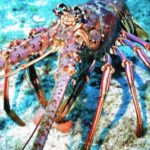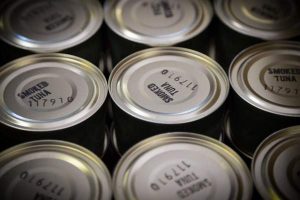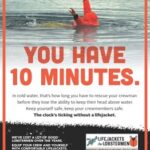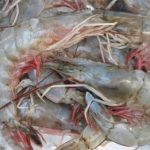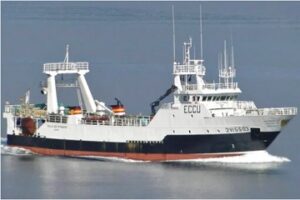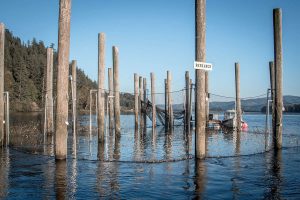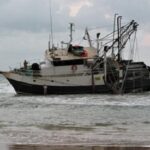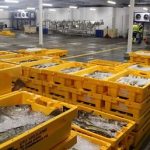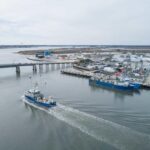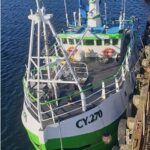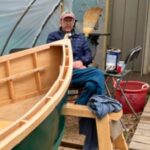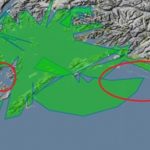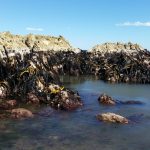Tag Archives: ”
Many fishermen believe Stokesbury saved the scallop industry
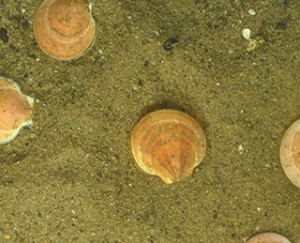 Well, I guess that I had better start writing some of this stuff down, as it seems that my memory is getting fuzzier by the day. Not an uncommon affliction for an old fisherman, who has been put ashore, but who still has enough recall to remember some things that are just too important to allow to fade into obscurity! I had been a scalloper out of New Bedford for 32 years, both as a deckhand, and as a captain of several high-line scalloper vessels. Over all those years there were several trips that stay relatively fresh in my mind’s eye, but one of the most important and fulfilling ones actually occurred after I came ashore. By Jim Kendall click here to read the story 21:55
Well, I guess that I had better start writing some of this stuff down, as it seems that my memory is getting fuzzier by the day. Not an uncommon affliction for an old fisherman, who has been put ashore, but who still has enough recall to remember some things that are just too important to allow to fade into obscurity! I had been a scalloper out of New Bedford for 32 years, both as a deckhand, and as a captain of several high-line scalloper vessels. Over all those years there were several trips that stay relatively fresh in my mind’s eye, but one of the most important and fulfilling ones actually occurred after I came ashore. By Jim Kendall click here to read the story 21:55
Hawaiʻi nearshore fishery provides big benefits
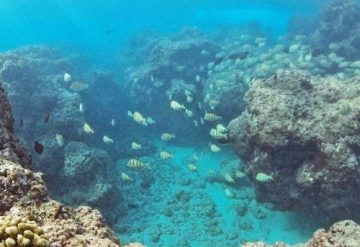 Small-scale fisheries support the well-being of millions of people around the world—even in a well-developed economy such as Hawaiʻi’s, they provide important economic as well as social benefits. The total annual monetary value of the fishery is approximately $10.3 to $16.4 million. The non-commercial fishery in particular provides huge benefits to the community—non-commercial catch is around three times reported commercial catch and is worth $4.2 to $10 million more annually. However, the full benefits to Hawaiʻi also include the potential to provide over 7 million meals a year as well as less tangible but just as important benefits such as the perpetuation of culture, community cohesion and sharing knowledge with the next generation. click here to read the story 20:22
Small-scale fisheries support the well-being of millions of people around the world—even in a well-developed economy such as Hawaiʻi’s, they provide important economic as well as social benefits. The total annual monetary value of the fishery is approximately $10.3 to $16.4 million. The non-commercial fishery in particular provides huge benefits to the community—non-commercial catch is around three times reported commercial catch and is worth $4.2 to $10 million more annually. However, the full benefits to Hawaiʻi also include the potential to provide over 7 million meals a year as well as less tangible but just as important benefits such as the perpetuation of culture, community cohesion and sharing knowledge with the next generation. click here to read the story 20:22
Commercial crabber calls out Al Gore on fake science, explains sea level hasn’t changed at all since 1970
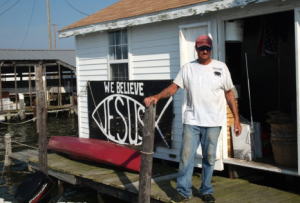 In promotion of his latest film, “An Inconvenient Sequel,” former vice president and global warming activist Al Gore is still desperately trying to make the case that planet earth is heating up, and that only carbon taxes can fix it. But as per usual, he failed miserably during a recent CNN town hall with Anderson Cooper, during which a commercial crabber and local mayor explained that sea levels around his tiny island have remained the same for over half a century. James Eskridge oversees the day-to-day activities on Tangier Island, in Virginia, and he’s been fishing crab there for decades. He’s quite familiar with the tides, the currents, and various other elements in and around the coastal terrain. And other than an ongoing problem related to erosion, in which the shorelines of Tangier Island are progressively disappearing due to constant waves and storms, he says that everything is exactly the same as it’s always been, at least as far as ocean levels are concerned. click here to read the story 09:25
In promotion of his latest film, “An Inconvenient Sequel,” former vice president and global warming activist Al Gore is still desperately trying to make the case that planet earth is heating up, and that only carbon taxes can fix it. But as per usual, he failed miserably during a recent CNN town hall with Anderson Cooper, during which a commercial crabber and local mayor explained that sea levels around his tiny island have remained the same for over half a century. James Eskridge oversees the day-to-day activities on Tangier Island, in Virginia, and he’s been fishing crab there for decades. He’s quite familiar with the tides, the currents, and various other elements in and around the coastal terrain. And other than an ongoing problem related to erosion, in which the shorelines of Tangier Island are progressively disappearing due to constant waves and storms, he says that everything is exactly the same as it’s always been, at least as far as ocean levels are concerned. click here to read the story 09:25
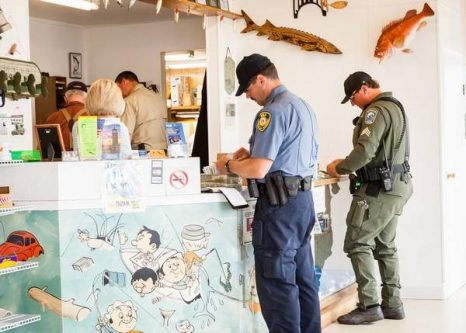
Local charter suspected of ‘high-grading’ prized halibut
Pacific Salmon Charters got an unexpected publicity boost earlier this month, when the crew of the Pacific Dream rescued passengers from a sunken boat. Last week, the company received not-so-welcome attention from state and federal game wardens. On Thursday, July 13, officers from the National Oceanic and Atmospheric Administration and Washington Department of Fish and Wildlife served a search warrant at the Pacific Salmon office at the Port of Ilwaco. According to the warrant, Pacific Salmon crews are suspected of habitually “high-grading,” or catching more than the legal limit of fish, and keeping only the most desirable specimens. Investigators say they have evidence that Pacific Salmon Charters crews high-graded on at least two trips during the short spring halibut season. click here to read the story 13:06
New Jersey man convicted of attempted murder in fish boat shooting case – faces life in prison
 A man who shot a Whitesboro woman aboard a fishing vessel docked at Lund’s Fisheries in October 2015 has been convicted of attempted murder, Cape May County Prosecutor Robert L. Taylor said. Ernest P. Davis, 44, also was convicted of possession of a firearm for an unlawful purpose and hindering his own prosecution following a one-week trial in Cape May County Superior Court, Taylor said. On Oct. 3, 2015, Davis shot Doris Howell, 39, with a shotgun while aboard the fishing vessel “Storm,” which was docked in Lower Township. As a result of the shooting, Howell’s left foot and part of her calf were amputated, Taylor said. Taylor said due to the charges and Davis’s criminal history, he faces a maximum of life imprisonment with an 85 percent parole disqualifier. click here to read the story 12:22
A man who shot a Whitesboro woman aboard a fishing vessel docked at Lund’s Fisheries in October 2015 has been convicted of attempted murder, Cape May County Prosecutor Robert L. Taylor said. Ernest P. Davis, 44, also was convicted of possession of a firearm for an unlawful purpose and hindering his own prosecution following a one-week trial in Cape May County Superior Court, Taylor said. On Oct. 3, 2015, Davis shot Doris Howell, 39, with a shotgun while aboard the fishing vessel “Storm,” which was docked in Lower Township. As a result of the shooting, Howell’s left foot and part of her calf were amputated, Taylor said. Taylor said due to the charges and Davis’s criminal history, he faces a maximum of life imprisonment with an 85 percent parole disqualifier. click here to read the story 12:22
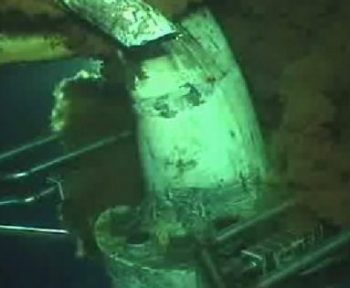
We should never allow offshore oil drilling near Myrtle Beach, BY Carol Coney
Jeffrey Nelson’s letter of May 9 tries to convey a sense of safety that new technology will bring to offshore drilling. He feels that underwater drilling platforms guided from miles away will somehow prevent oil spills. What he fails to mention is that technology quite often fails. Combine remote control with a platform many miles beneath the surface, and you are asking for disaster. Yet his premise is that if it is underwater and you can’t see it, it must be safe.Consider this: The Deepwater Horizon drilling platform was using proven technology and, according to the government investigation, failed because of human error and gross negligence. No amount of new technology will eliminate causes like that. Click here to read the op-ed 16:58
“Hero of the Seas” – Robin Alden wins more accolades
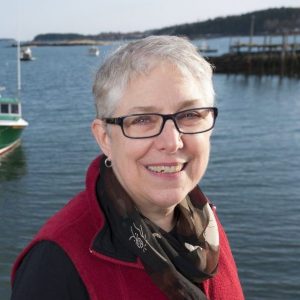 Robin Alden, Maine Center for Coastal Fisheries’ executive director, has been recognized as a “Hero of the Seas,” as a winner of the international Peter Benchley Ocean Awards. Alden was recognized for her career working at the grassroots, engaging fishermen’s knowledge and participation to build sustainable, healthy coastal fisheries and fishing communities. The awards ceremony took place at a gala on Thursday, May 11, at the Smithsonian Institution’s National Museum of Natural History in Washington, D.C. “It is just unbelievable to have international recognition for Maine Center for Coastal Fisheries’ basic approach: that the knowledge fishermen have about the ecology they work in every day is important to a healthy fisheries and our communities,” Alden said in a statement last Friday. Click here to read the story 10:16
Robin Alden, Maine Center for Coastal Fisheries’ executive director, has been recognized as a “Hero of the Seas,” as a winner of the international Peter Benchley Ocean Awards. Alden was recognized for her career working at the grassroots, engaging fishermen’s knowledge and participation to build sustainable, healthy coastal fisheries and fishing communities. The awards ceremony took place at a gala on Thursday, May 11, at the Smithsonian Institution’s National Museum of Natural History in Washington, D.C. “It is just unbelievable to have international recognition for Maine Center for Coastal Fisheries’ basic approach: that the knowledge fishermen have about the ecology they work in every day is important to a healthy fisheries and our communities,” Alden said in a statement last Friday. Click here to read the story 10:16
Too broke for boats, Cubans inflate condoms to find big fish
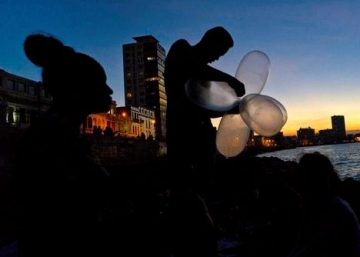 Juan Luis Rosello sat for three hours on the Malecon as the wind blew in from the Florida Straits, pushing the waves hard against the seawall of Havana’s coastal boulevard. As darkness settled and the wind switched direction, Rosello pulled four condoms from a satchel and began to blow them up. When the contraceptives were the size of balloons, the 47-year-old cafeteria worker tied them together by their ends, attached them to the end of a baited fishing line and set them floating on the tide until they reached the end of his 750-foot line. After six decades under U.S. embargo and Soviet-inspired central planning, Cubans have become masters at finding ingenious solutions with extremely limited resources. Few are as creative as what Havana’s fishermen call “balloon fishing,” a technique employing a couple of cents worth of condoms to pull fish worth an average month’s salary from the ocean. Read the story here 09:21
Juan Luis Rosello sat for three hours on the Malecon as the wind blew in from the Florida Straits, pushing the waves hard against the seawall of Havana’s coastal boulevard. As darkness settled and the wind switched direction, Rosello pulled four condoms from a satchel and began to blow them up. When the contraceptives were the size of balloons, the 47-year-old cafeteria worker tied them together by their ends, attached them to the end of a baited fishing line and set them floating on the tide until they reached the end of his 750-foot line. After six decades under U.S. embargo and Soviet-inspired central planning, Cubans have become masters at finding ingenious solutions with extremely limited resources. Few are as creative as what Havana’s fishermen call “balloon fishing,” a technique employing a couple of cents worth of condoms to pull fish worth an average month’s salary from the ocean. Read the story here 09:21
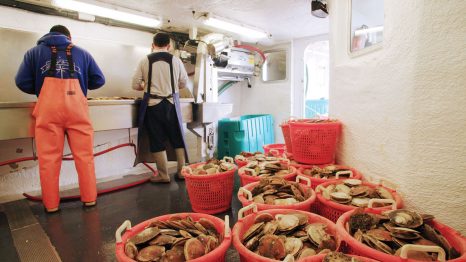
Sea Scallop Documentary To Be Screened At the 25th annual Woods Hole Film Festival August 3 at 6 PM
Over the past two decades, the unassuming sea scallop has brought on a quiet revolution in East Coast fisheries, one based on cooperation between fishermen, scientists, and government managers. In the 35-minute documentary “Sustaining Sea Scallops,” Woods Hole-based filmmakers Daniel Cojanu and Elise Hugus ask if this cooperative research approach could be the new model for beleaguered fisheries. Premiering at the 25th annual Woods Hole Film Festival on August 3 at 6 PM, with a repeat screening on August 5 at 7 PM before the feature documentary “The Memory of Fish,” “Sustaining Sea Scallops” tells a rare tale of renewal in a commercial fishery. The documentary brings audiences back to 1999, when fisheries closures and bankruptcy prompted the sea scallop industry to start funding research to improve catch efficiency, while simultaneously minimizing environmental impacts. Fifteen years later, the Atlantic sea scallop fishery is hailed as one of the most sustainable and lucrative in the world, with New Bedford ringing in as the highest-grossing port in the nation. Read the rest here 20:11
Rescue at sea
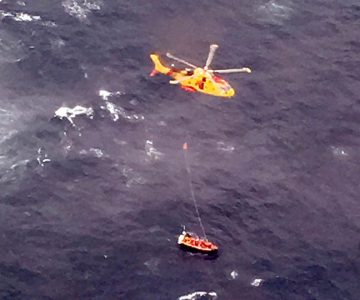 On Monday 442 Transport and Rescue Squadron was involved in a rescue mission on the west side of Vancouver Island. 442 Squadron was tasked by Joint Rescue Coordination Centre (JRCC) Victoria to assist the Canadian Coast Guard in a rescue of a “man overboard,” 13 nautical miles west of Kyuquot Channel. Canadian Coast Guard Inshore Rescue Boat (IRB) 507 located and rescued the man, who had fallen overboard from a small fishing vessel about three hours earlier. The man was subsequently hoisted aboard one of 442 Squadron’s CH-149 Cormorant helicopters, flown to Comox, then transported via ambulance to St. Joseph’s Hospital. No further details on the victim’s conditions, or his place of residence, were available at time of printing. link 21:41
On Monday 442 Transport and Rescue Squadron was involved in a rescue mission on the west side of Vancouver Island. 442 Squadron was tasked by Joint Rescue Coordination Centre (JRCC) Victoria to assist the Canadian Coast Guard in a rescue of a “man overboard,” 13 nautical miles west of Kyuquot Channel. Canadian Coast Guard Inshore Rescue Boat (IRB) 507 located and rescued the man, who had fallen overboard from a small fishing vessel about three hours earlier. The man was subsequently hoisted aboard one of 442 Squadron’s CH-149 Cormorant helicopters, flown to Comox, then transported via ambulance to St. Joseph’s Hospital. No further details on the victim’s conditions, or his place of residence, were available at time of printing. link 21:41
North Pacific Fishery Management Council convenes in Kodiak with Gulf catch shares in focus
The trawl industry already loathes a recent alternative to a North Pacific Fishery Management Council plan . Now the council could add another. The North Pacific Fishery Management Council will meet in Kodiak from June 6-14 to hear a discussion paper that has enraged the trawl industry since late 2015. A new proposal for “innovative policy,” as referred to in the paper, would give the first catch share allocations to Community Fishing Associations to prevent harmful impacts such as the job losses and high cost of entry that have occurred under previous such programs in halibut and crab. This is an official state position, and the North Pacific council holds a six-member majority of the 11-member body that governs federal Alaska waters. Gov. Bill Walker’s administration prioritizes coastal communities’ economic prospects during the state’s oil-driven financial calamity. Part of that stance concerns keeping the fishing industry, the state’s largest private employer, in Alaskan fishermen’s hands. Read the rest here 08:39
. Now the council could add another. The North Pacific Fishery Management Council will meet in Kodiak from June 6-14 to hear a discussion paper that has enraged the trawl industry since late 2015. A new proposal for “innovative policy,” as referred to in the paper, would give the first catch share allocations to Community Fishing Associations to prevent harmful impacts such as the job losses and high cost of entry that have occurred under previous such programs in halibut and crab. This is an official state position, and the North Pacific council holds a six-member majority of the 11-member body that governs federal Alaska waters. Gov. Bill Walker’s administration prioritizes coastal communities’ economic prospects during the state’s oil-driven financial calamity. Part of that stance concerns keeping the fishing industry, the state’s largest private employer, in Alaskan fishermen’s hands. Read the rest here 08:39
To avoid another massive fish kill in the Peconic, limits on bunker fishing lifted by “episodic event set aside program,”
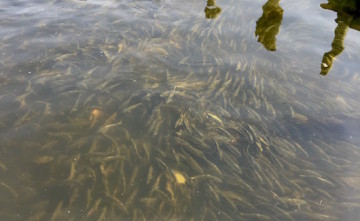 With unusually large numbers of bunker fish appearing in the Peconic River this spring, commercial fishermen will be allowed to net bunker in an effort to prevent the massive bunker kills seen last year, thanks to a ruling announced today by the Atlantic States Marine Fisheries Commission. The interstate commission, which limits how many fish can be caught each year, has agreed to add New York to a special program that allows greater numbers of bunker to be harvested in places where bunker are occurring in higher abundance than normal. The decision was made specifically to reduce the amount of bunker in the Peconic Estuary, where bunker have been reported in unusually large numbers since last month. Commercial fishermen will be allowed to use seine nets to capture bunker in the Peconic River. Up to one million pounds of bunker are allowed to be harvested under the episodic event set aside program. Read the rest here 14:25
With unusually large numbers of bunker fish appearing in the Peconic River this spring, commercial fishermen will be allowed to net bunker in an effort to prevent the massive bunker kills seen last year, thanks to a ruling announced today by the Atlantic States Marine Fisheries Commission. The interstate commission, which limits how many fish can be caught each year, has agreed to add New York to a special program that allows greater numbers of bunker to be harvested in places where bunker are occurring in higher abundance than normal. The decision was made specifically to reduce the amount of bunker in the Peconic Estuary, where bunker have been reported in unusually large numbers since last month. Commercial fishermen will be allowed to use seine nets to capture bunker in the Peconic River. Up to one million pounds of bunker are allowed to be harvested under the episodic event set aside program. Read the rest here 14:25
CG36500 – Renovated rescue boat ready for the spotlight
 Following an $18,000 renovation this fall at Chatham’s Pease Boatworks, the 36-foot wooden Coast Guard motor lifeboat is ready for the red carpet. The CG36500 is on the National Register of Historic Places, so stunt doubles were used in the new movie, “The Finest Hours,” which has its premiere tomorrow at Grauman’s Chinese Theatre in Los Angeles. While Andy Fitzgerald, the sole surviving crewman of what is hailed as the greatest small boat rescue in Coast Guard history, and his wife, Gloria, are headed to that premiere, the real rescue boat that safely transported four Coast Guardsmen and 32 crewmen from a stricken tanker back from a hellish nor’easter will be on display at the Chatham Bars Inn Thursday night for a pre-release party. Read the article here 12:06
Following an $18,000 renovation this fall at Chatham’s Pease Boatworks, the 36-foot wooden Coast Guard motor lifeboat is ready for the red carpet. The CG36500 is on the National Register of Historic Places, so stunt doubles were used in the new movie, “The Finest Hours,” which has its premiere tomorrow at Grauman’s Chinese Theatre in Los Angeles. While Andy Fitzgerald, the sole surviving crewman of what is hailed as the greatest small boat rescue in Coast Guard history, and his wife, Gloria, are headed to that premiere, the real rescue boat that safely transported four Coast Guardsmen and 32 crewmen from a stricken tanker back from a hellish nor’easter will be on display at the Chatham Bars Inn Thursday night for a pre-release party. Read the article here 12:06
A sign from the sea – Big Pine Key trap washes ashore in Ireland
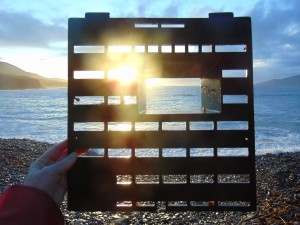 Rosemary Hill never knows what the sea will bring to her that day. She has a passion for beachcombing on the sandy strands next to her hometown of Waterville, a small fishing village in County Kerry, Ireland. In recent weeks, among other things, she’s found a multitude of tropical sea beans, a half-destroyed Christmas decoration and Hewlett-Packard printer ink cartridges. On Jan. 8, she discovered something intriguing: the top of a stone crab trap. “We don’t have these in Ireland,” she thought. And when she looked closely, she saw a name scratched into the surface: “J. Gates, Big Pine Key.” photo; Rosemary Hill, “Beachcombing in Kerry,”link Read the article here 08:29
Rosemary Hill never knows what the sea will bring to her that day. She has a passion for beachcombing on the sandy strands next to her hometown of Waterville, a small fishing village in County Kerry, Ireland. In recent weeks, among other things, she’s found a multitude of tropical sea beans, a half-destroyed Christmas decoration and Hewlett-Packard printer ink cartridges. On Jan. 8, she discovered something intriguing: the top of a stone crab trap. “We don’t have these in Ireland,” she thought. And when she looked closely, she saw a name scratched into the surface: “J. Gates, Big Pine Key.” photo; Rosemary Hill, “Beachcombing in Kerry,”link Read the article here 08:29
Salvadoran castaway hit with cannibalism suit, denies he ate his shipmate to stay alive
 José Salvador Alvarenga’s story captivated the world nearly two years ago, when the Salvadoran-born fisherman was rescued in the South Pacific having spent 14 months adrift in a small fishing boat. But this week, Alvarenga’s heartwarming story – which has been turned into a book, “438 Days,” by the English journalist, Jonathan Franklin – took a grisly turn. Relatives of the man who he was shipwrecked with, Ezequiel Córdova Ríos, and who reportedly starved to death months into the ordeal, have filed a million-dollar lawsuit against Alvarenga alleging that he cannibalized,,, Read the article here 12:40
José Salvador Alvarenga’s story captivated the world nearly two years ago, when the Salvadoran-born fisherman was rescued in the South Pacific having spent 14 months adrift in a small fishing boat. But this week, Alvarenga’s heartwarming story – which has been turned into a book, “438 Days,” by the English journalist, Jonathan Franklin – took a grisly turn. Relatives of the man who he was shipwrecked with, Ezequiel Córdova Ríos, and who reportedly starved to death months into the ordeal, have filed a million-dollar lawsuit against Alvarenga alleging that he cannibalized,,, Read the article here 12:40
Film sheds light on years of controversy with Port and Fishermen at Fishermen’s Terminal
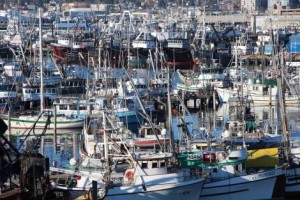 West Seattle filmmaker and Antioch University instructor, B. J. Bullert (Ph.D), has made a second film that examines “the news” created during a period when the Port of Seattle was being scrutinized by the media and fishermen for their management and policy decisions. The 23-minute film, “Fishermen’s Terminal Revisited: A Story of Survival” is a follow up to “Fishermen’s Terminal,” a film from 2005 that documents the backlash from fishermen as the Port allowed pleasure boats to moor alongside fishing boats at terminal. Read the article here 21:49
West Seattle filmmaker and Antioch University instructor, B. J. Bullert (Ph.D), has made a second film that examines “the news” created during a period when the Port of Seattle was being scrutinized by the media and fishermen for their management and policy decisions. The 23-minute film, “Fishermen’s Terminal Revisited: A Story of Survival” is a follow up to “Fishermen’s Terminal,” a film from 2005 that documents the backlash from fishermen as the Port allowed pleasure boats to moor alongside fishing boats at terminal. Read the article here 21:49
Editorial: Drowning in regulations
 President Obama is poised to designate two large areas off the New England coast as national marine “monuments,” to the delight of conservationists who seem much more interested in protecting the ocean than they are in protecting people. Gov. Charlie Baker has written to President Obama to express concern about the impact on the region’s fishermen if the federal government turns part of the New England coastline into a sort of undersea museum — one that only scientists are likely ever to lay eyes on. Baker in his letter raises reasonable concerns about the process — or lack thereof — that led to this point. Read the rest here 12:00
President Obama is poised to designate two large areas off the New England coast as national marine “monuments,” to the delight of conservationists who seem much more interested in protecting the ocean than they are in protecting people. Gov. Charlie Baker has written to President Obama to express concern about the impact on the region’s fishermen if the federal government turns part of the New England coastline into a sort of undersea museum — one that only scientists are likely ever to lay eyes on. Baker in his letter raises reasonable concerns about the process — or lack thereof — that led to this point. Read the rest here 12:00
‘The Long Haul’ looks at the future of Cape fishing
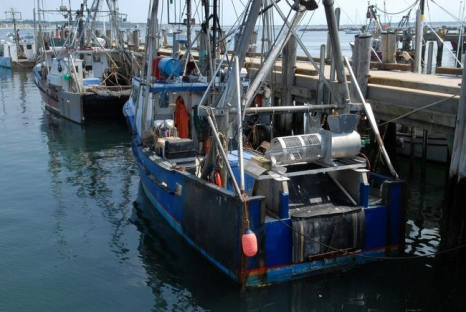 Eight years ago, Pedro Verde, captain of the dragger F/V Blue Ocean, stood on MacMillan Pier and blasted scientists and fisheries regulators for allowing him to fish only 52 days the previous year. He was talking to Sean Corcoran, a reporter at public radio station WCAI who was investigating the decline of the Provincetown dragger fishery. Those reports have now been collected in a book, “The Long Haul: The Future of New England’s Fisheries,” edited by Corcoran and published by Clock & Rose Press in Harwich Port. Read the rest here 19:17
Eight years ago, Pedro Verde, captain of the dragger F/V Blue Ocean, stood on MacMillan Pier and blasted scientists and fisheries regulators for allowing him to fish only 52 days the previous year. He was talking to Sean Corcoran, a reporter at public radio station WCAI who was investigating the decline of the Provincetown dragger fishery. Those reports have now been collected in a book, “The Long Haul: The Future of New England’s Fisheries,” edited by Corcoran and published by Clock & Rose Press in Harwich Port. Read the rest here 19:17









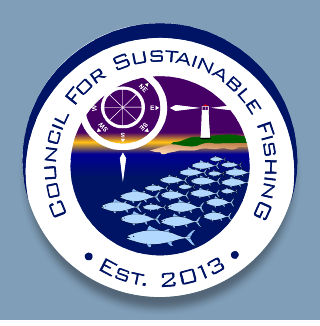
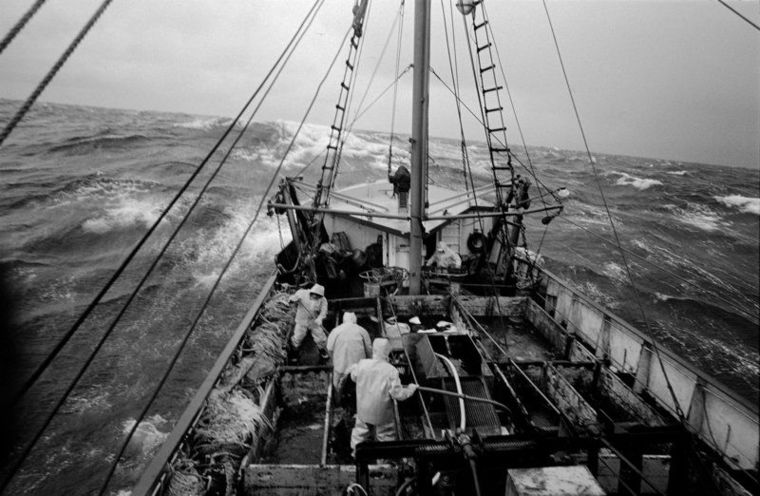 When Nubar Alexanian started visiting Gloucester in 1971 as a young man of 21, the harbor bustled with fishing vessels that hauled in millions of pounds a fish a day. He captured the hive of activity among the Gloucester-based fleet from onshore and on extended trips offshore. The Worcester-born photographer soon made the nation’s oldest seaport his home, immersing himself into the cornucopia of Gloucester life and landscape.
When Nubar Alexanian started visiting Gloucester in 1971 as a young man of 21, the harbor bustled with fishing vessels that hauled in millions of pounds a fish a day. He captured the hive of activity among the Gloucester-based fleet from onshore and on extended trips offshore. The Worcester-born photographer soon made the nation’s oldest seaport his home, immersing himself into the cornucopia of Gloucester life and landscape. 



























